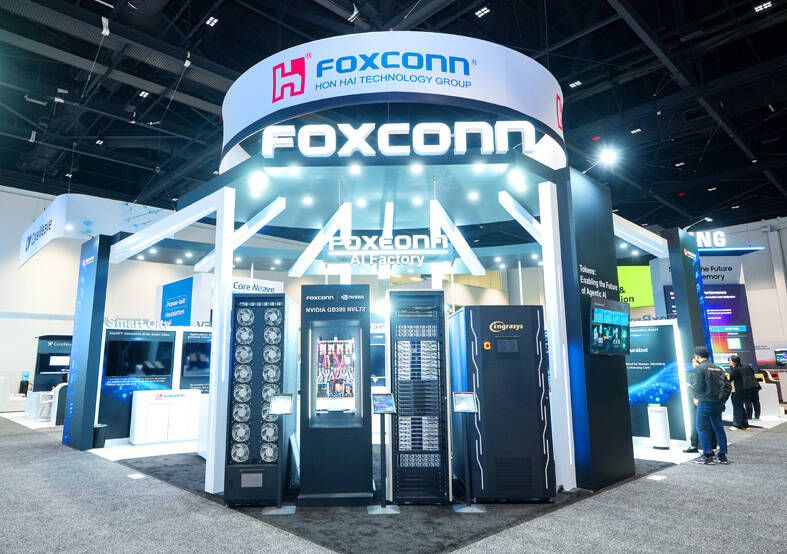Hon Hai Precision Industry Co (鴻海精密) expects server revenue to exceed its iPhone revenue within two years, with the possibility of achieving this goal as early as this year, chairman Young Liu (劉揚偉) said on Tuesday at Nvidia Corp’s annual technology conference in San Jose, California.
AI would be the primary focus this year for the company, also known as Foxconn Technology Group (富士康科技集團), as rapidly advancing AI applications are driving up demand for AI servers, Liu said.
The production and shipment of Nvidia’s GB200 chips and the anticipated launch of GB300 chips in the second half of the year would propel Hon Hai’s strong revenue growth, he said.

Photo courtesy of Hon Hai Precision Industry Co via CNA
Liu’s remarks came as the company showcased new AI server racks and other products at the weeklong GPU Technology Conference (GTC). He led a delegation of more than 70 engineers and executives to the event this year, doubling the size from last year. The company is among more than 20 Taiwanese companies joining this year’s GTC.
Hon Hai was the first of Nvidia’s AI server partners to display new-generation AI server racks at the event, with its GB300 NVL72 server rack featuring Nvidia’s new Blackwell Ultra graphics processing units, 36 of Nvidia’s Grace central processing units, advanced superchip ecosystems, liquid cooling technology and Nvidia’s Omniverse digital twin technology.
The company’s subsidiary Ingrasys Technology Inc (鴻佰科技) is supplying the new liquid cooling solutions to AI server racks equipped with GB300 chips, it said.
Hon Hai, which Liu said is currently the world’s largest AI server supplier, is ramping up production of those high-end servers based on Nvidia's GB200 chips after starting small-volume production in December last year.
At the event, the company also showcased several automated machines, including hybrid robots that integrate high-end visual recognition, and precision motion technologies that support the semiconductor industry and automation needs.
The company’s AI nursing robot, Nurabot, made its debut at the GTC. Nurabot is designed to optimize medical workflows and enhance patient care, Hon Hai said.
The robot would first enter service at Taichung Veterans General Hospital and in the company’s partner hospitals in Taiwan later this year, it said.
In addition to Hon Hai, Wiwynn Corp (緯穎) showcased a series of new servers based on Nvidia’s GB300 NVL72 in collaboration with its parent company, Wistron Corp (緯創).
Wiwynn is one of the first electronics makers to supply GB200 NVL 72 server racks, the company said.
Wiwynn also demonstrated new AI servers running on Nvidia’s HGX B300 NVL 16, as well as a direct liquid cooling rack, the company said.
Meanwhile, Asustek Computer Inc (華碩) exhibited new AI pods, server racks equipped with Nvidia’s GB300 NVL72, and servers running on Nvidia B200 NVL8 and HGX H200 chips.
The company has secured orders for the new AI pods, it said.
Additional reporting by CNA

TARIFFS: The global ‘panic atmosphere remains strong,’ and foreign investors have continued to sell their holdings since the start of the year, the Ministry of Finance said The government yesterday authorized the activation of its NT$500 billion (US$15.15 billion) National Stabilization Fund (NSF) to prop up the local stock market after two days of sharp falls in reaction to US President Donald Trump’s new import tariffs. The Ministry of Finance said in a statement after the market close that the steering committee of the fund had been given the go-ahead to intervene in the market to bolster Taiwanese shares in a time of crisis. The fund has been authorized to use its assets “to carry out market stabilization tasks as appropriate to maintain the stability of Taiwan’s

STEEP DECLINE: Yesterday’s drop was the third-steepest in its history, the steepest being Monday’s drop in the wake of the tariff announcement on Wednesday last week Taiwanese stocks continued their heavy sell-off yesterday, as concerns over US tariffs and unwinding of leveraged bets weighed on the market. The benchmark TAIEX plunged 1,068.19 points, or 5.79 percent, to 17,391.76, notching the biggest drop among Asian peers as it hit a 15-month low. The decline came even after the government on late Tuesday authorized the NT$500 billion (US$15.2 billion) National Stabilization Fund (國安基金) to step in to buoy the market amid investors’ worries over tariffs imposed by US President Donald Trump. Yesterday’s decline was the third-steepest in its history, trailing only the declines of 2,065.87 points on Monday and

TARIFF CONCERNS: The chipmaker cited global uncertainty from US tariffs and a weakening economic outlook, but said its Singapore expansion remains on track Vanguard International Semiconductor Corp (世界先進), a foundry service provider specializing in producing power management and display driver chips, yesterday withdrew its full-year revenue projection of moderate growth for this year, as escalating US tariff tensions raised uncertainty and concern about a potential economic recession. The Hsinchu-based chipmaker in February said revenues this year would grow mildly from last year based on improving supply chain inventory levels and market demand. At the time, it also anticipated gradual quarter revenue growth. However, the US’ sweeping tariff policy has upended the industry’s supply chains and weakened economic prospects for the world economy, it said. “Now

Six years ago, LVMH’s billionaire CEO Bernard Arnault and US President Donald Trump cut the blue ribbon on a factory in rural Texas that would make designer handbags for Louis Vuitton, one of the world’s best-known luxury brands. However, since the high-profile opening, the factory has faced a host of problems limiting production, 11 former Louis Vuitton employees said. The site has consistently ranked among the worst-performing for Louis Vuitton globally, “significantly” underperforming other facilities, said three former Louis Vuitton workers and a senior industry source, who cited internal rankings shared with staff. The plant’s problems — which have not